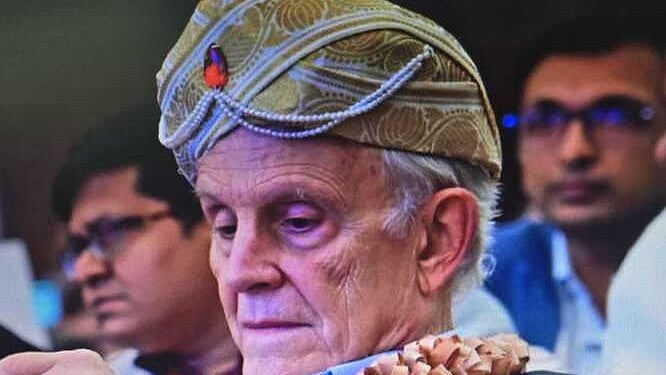
Nobel Prize in Physics (2004) awardee David Gross.
Credit: DH photo
Bengaluru: Nobel Prize in Physics (2004) awardee David Gross presented a keynote lecture at the Quantum India Bengaluru Summit on Friday.
The second day of the summit kicked off with a lecture by Gross, who spoke about the evolution of quantum mechanics, its current scientific foundations, and India and Bengaluru’s role in quantum’s future.
Gross started his speech by appreciating the state’s sciences and the Karnataka government’s efforts and keen interest in the field of quantum.
“The origins of quantum mechanics happened more than 100 years ago with Max Planck, who was interested in understanding the spectrum of blackbody radiation — radiation trapped in a box as a distribution of power at different wavelengths. And the empirical curve conflicted with the predictions of classical theory at that time. Planck found a beautiful formula that fit the data,” he shared, explaining the evolution and ongoing trajectory of quantum mechanics.
The professor shared insights on how various scientists and thinkers like Planck, Albert Einstein, Niels Bohr, and Erwin Schrodinger have contributed to the current understanding of quantum mechanics, how it is all backed by the understanding of nature.
Talking about India’s future in Quantum, he stressed on the need for technological developments in the country. “I have also stated in the past about how while the ‘Make in India’ initiative is good, in order to make in India, and to compete with better and cheaper goods from abroad, one first has to have new technology. And new technology is based on science. You first have to invent in India. You can't just invent by relying on the underlying science done elsewhere. You first have to discover it in India,” he stated.
“India's gross expenditure on R&D has more than doubled since the last ten years. But, as a percentage of the GDP, which has increased much more rapidly, spending remains at the incredibly low level of 0.64%. This is significantly lower than the global average. It lags behind countries like China by a factor of four, the US by over a factor of five, by countries like Israel by almost a factor of ten,” he added.
The way forward for quantum in Karnataka should focus on not repeating this pattern, he suggested. “Discover, invent, and make in Bengaluru. Individuals can make a difference. I would like to congratulate the state of Karnataka on this exciting initiative,” he concluded.
2016 Nobel Laureate in Physics stressed on the same topic during his keynote address on the first day of the summit. He noted that it is important for every country to have at least one centre that focuses on world-class science.
“Government investment in science education and allowing universities to participate in world-class science, will pay back as it will produce a local culture where innovation in quantum and other technologies can flourish locally,” he added.